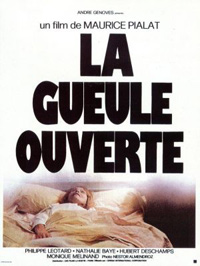A Death in the Family: Pialat’s Subtle Masterpiece of Familial Anguish
 French auteur Maurice Pialat, the famed Palme d’Or winner who resisted being defined by a particular time, movement, or theme, receives another retrospective in 2015. Of the ten titles in his filmography, five have been chosen on this tour, several of them notable restorations of works that have become increasingly difficult to track down over the years. While more notable titles, like 1983’s A nos amours and his 1968 debut L’enfance Nue have received widespread recuperations (thanks in part to their placement within the Criterion collection), Cohen Media Group resuscitates some lesser known works. One of the most exciting of these is his 1974 title The Mouth Agape, a portrait of familial woe a bit less histrionic than other examples of societal strains evidenced on Pialat’s famous nuclear units and troubled couples. Documenting the death of a mother, and its effects (or lack thereof) on her immediate family members, Pialat paints a very believable portrait of human interaction, one that is filled with melancholy, but also humorous moments concerning notions of love, fidelity, and the inevitable end of it all.
French auteur Maurice Pialat, the famed Palme d’Or winner who resisted being defined by a particular time, movement, or theme, receives another retrospective in 2015. Of the ten titles in his filmography, five have been chosen on this tour, several of them notable restorations of works that have become increasingly difficult to track down over the years. While more notable titles, like 1983’s A nos amours and his 1968 debut L’enfance Nue have received widespread recuperations (thanks in part to their placement within the Criterion collection), Cohen Media Group resuscitates some lesser known works. One of the most exciting of these is his 1974 title The Mouth Agape, a portrait of familial woe a bit less histrionic than other examples of societal strains evidenced on Pialat’s famous nuclear units and troubled couples. Documenting the death of a mother, and its effects (or lack thereof) on her immediate family members, Pialat paints a very believable portrait of human interaction, one that is filled with melancholy, but also humorous moments concerning notions of love, fidelity, and the inevitable end of it all.
Monique (Monique Melinand) is dying. She’s been married to Hubert (Hubert Deschamps) for decades, a philandering clothing and fabric store owner in Auvergne, and his wife’s diagnosis hasn’t resulted in ebbing his appetite for sleeping with other women. Their son Philippe (Philippe Leotard) and his wife Nathalie (Nathalie Baye) have come from Paris to be with Monique and it is evident Philippe feels quite close to his mother (a feeling Nathalie does not share). He announces his own marriage to Nathalie as much more fitting than that of his parents, since theirs was more a matter of convenience and social custom, never mind that Philippe also cheats quite regularly on his wife.
Like many of Pialat’s films, there’s a startling degree of intimacy revealed between characters captured without any hint of sentimentality. The actors sharing the same first names as their characters indicates a sort of disappearance into these particular characters. The Mouth Agape follows one of Pialat’s darkest (and funniest) films, 1972’s We Won’t Grow Old Together, and the two couples reflecting each other here aren’t the same lives wires of emotion—instead, Pialat captures the wasted away quality of repressive marital unions, whereby gender roles and social positions are determining factors of misery.
Conversations reveal Monique to be of superior stock, a Parisian who settled for the provincial Hubert. She’s never approved of her son’s marriage to Nathalie, a woman she deemed not good enough for her own son. Age old issues concerning the difference between men and women in heterosexual relationships play out as tired rules of engagement. But Pialat doesn’t make his female characters passive victims. One of Monique’s last gasped bits of dialogue find her consumed on the death bed with her husband’s affairs (an early mention of a Gene Tierney photo haunts her), while Nathalie seems to revel in equally unkind memories after a bout of lovemaking with Philippe (“Remember that eczema I had,” she muses).
Pialat procures some superb interactions between this excellent quartet of actors. Melinand (who appeared in films by Julien Duvivier and Raul Ruiz, and was the last love of actor Louis Jouvet) and Deschamps (a favored player by Louis Malle) were notable characters actors, while Leotard would appear in a wide variety of features, including a reunion with Baye in Bob Swaim’s 1982 La Balance (for which they both won Cesars). Of course, Baye would go on to be an internationally renowned actress. This being her third film feature, it’s curious to see her so young and portraying such a complex range of emotion as the outsider of the group.
Pialat employs legendary cinematographer Nestor Almendros for The Mouth Agape, during a period when the DoP was working with French New Wave alums like Rohmer and Truffaut, and just a few short years before his Oscar win for Malick’s Days of Heaven (1978). His frames glide over indelible details of Monique and Hubert’s banal lives. The cramped quarters of the clothing store feels almost like a magical escape into a cubbyhole following the yellowed, sparse living quarters attached to the storefront. In fact, one of the most notable interiors takes place between Philippe and a young blonde he’s fetched out of the streets. We learn two surprises in their interaction, the first being she’s not a prostitute and the second that’s it’s an hourly rate joint. Likewise, volumes of repressed emotion surface in a beautiful sequence where the near comatose Monique lies in bed, eyes glazed over, while Philippe rifles sporadically through a forgotten family photo album entombed in the same shrouded room.
A final closing shot is indeed one of the finest of the film, a poetic au revoir to a film fascinated with the inevitability and utter banality of death.
★★★★/☆☆☆☆☆


